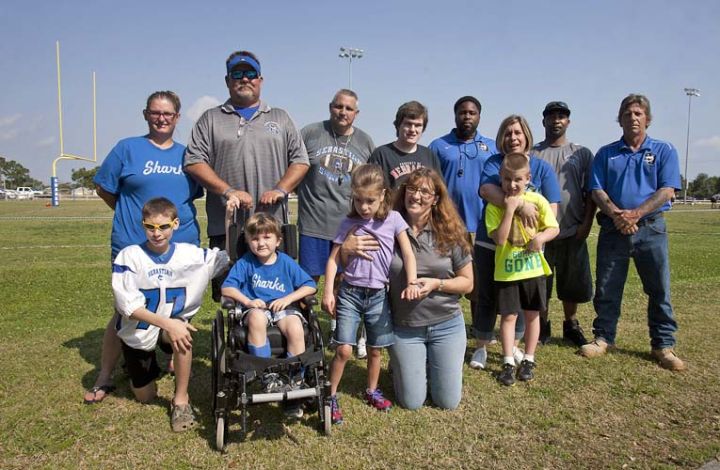SEBASTIAN — Kelly Green sits on the board of the nonprofit, started by her late father, Cyril “JR” Knowles. They share a family love and passion for football and believe it is a way to give back to the community the way the community benefited them.
As she watched games played by and cheered for by able-bodied children, she noticed other children who sat by with parents and had little to do. The differently-abled children will now have a chance to get on the field like their siblings.
With Green’s leadership and the help of many other community leaders and current heads of business, the new division of Extraordinary Sharks has been added to the sports association so that children with disabilities can join football and cheerleading teams.
“I would see these children so excited, just happy to be there. I thought, as much as football and cheerleading has helped make our community’s children grow into healthy team players and leaders, how much more could it help children with disabilities who long to be just like anyone else?” Green said.
Enrollment is now open. The season starts May 6 and runs through June 22. Children from all over Indian River County are welcome to join the Extraordinary Sharks.
Rather than a full-contact sport, the flag football division is for children from 4 to 14 that have special needs. Play is open to even the most severely developmentally delayed or wheelchair dependent.
Each child will be a part of an NFL-named team, such as the Steelers, Giants, Patriots and Buccaneers. Participants will learn sportsmanship and football.
Teams will play until, and only when, one side scores. Then, the other team plays until it scores. There will not be a competitive component, but rather, lots of positive reinforcement.
This positive reinforcement, rather than the traditional tough, negative correction of mainstream sports coaching, is a major component to successfully teaching special education, according to Kristin Knight, an ESE special needs teacher at Liberty Magnet School.
Knight will volunteer her time and skills to work with coaches and other volunteers, teaching them the tactics used to help challenged children succeed.
Practices will be for an hour one day a week. Games will be on Saturdays.
Michelle Day, who serves on the Sharks association board with Green, was the first person Green approached with the idea to see if it might be of interest to families of children with disabilities.
Day’s son, Bryson, 5, is in a wheelchair.
The response from Day and other parents was an emphatic, yes.
“This will be an exciting and memorable time for kids and their parents,” Green said.
The pair then joined forces and moved on to the community. They were interested in seeing if volunteers and supporters might also feel it a worthy investment of time, talent and resources.
“They responded just as enthusiastically,” Green said. “I’m pleased with the support of our community and their involvement.”
Volunteers will be plentiful. Each child will have one assigned to him or her so that each can take part no matter how severe the physical or mental disability.
In a day when so many former stay-at-home helpers are busy helping to bring in household resources, still, they, their spouses, seniors and the children’s able-bodied Sharks peers, are attracted in sufficient numbers to the project.
Purse-string holders are also willing to dig deep.
Communications International donated $400 in seed money. Scott’s Sporting Goods will donate all the jerseys.
Steve Farmer will donate all the trophies, one for each participant for taking part, rather than for winning competitively.
Businesses that Green is in the process of approaching share something in common with her.
Like many pioneer families whose descendants now lead community benefit foundations and entities, the Knowles family from which Green hails was an industry leader.
Profits racked up by hard-driving industrialists and businesses now sit in foundations that dole out money to worthy causes by their descendants who are either native to the area or who have retired to Indian River County from the North to enjoy the weather and the growing culture of their peers.
The Knowles family was among the first to move to Roseland and ran a major fish and seafood operation. While the market moved away from the business, its descendants remained in the area.
The family also has ties to farming, as do nearly all the pioneer families.
They are part of the Duda clan whose farmlands and the new communities on them stretch all the way north and east to Central Florida.
Like the Duda and the Knowles families, along the way, retired heads of industry and their descendants began to have children borne to their families with developmental disabilities, just as would any families.
Founding families did not want for the resources to help their children, but they typically lacked the connection to the best groups and solutions to provide the best life for their charges, and ongoing care should they outlive their parents.
“My nephew has autism, and he loves football,” Green said.
The Duda family backs a nonprofit project to create a community to serve Indian River and Brevard counties and beyond, where young adults with disabilities can age out among peers with and without disabilities, with access to health care, therapies, recreation and all things for a rich, fulfilling life.
This passion, combined with a general desire to give back to the community that had been so generous to them, has driven many leaders to seek out or be receptive to proposals that help those less-abled, especially when these agencies are called upon to help families who are dealt the one-two blow of disability combined with insufficient income to pay for the best interventions.

